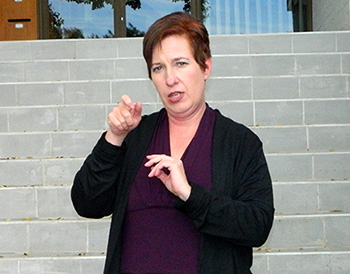Latest News Archive
Please select Category, Year, and then Month to display items
05 June 2018
Photo Supplied
 Archaeological excavations in the Wonderwerk Cave, north of Kuruman in the Northern Cape.
Archaeological excavations in the Wonderwerk Cave, north of Kuruman in the Northern Cape.
Research fellow Dr Lloyd Rossouw from the Department of Plant Sciences at the University of the Free State (UFS) recently published an article in the Nature Ecology and Evolution journal with Dr Michaela Ecker from the University of Toronto as lead author, and Dr James Brink, research fellow at the UFS Centre for Environmental Management. The findings described in “The palaeoecological context of the Oldowan-Acheulean in southern Africa” provides the first extensive paleoenvironmental sequence for the interior of southern Africa by applying a combination of methods for environmental reconstruction at Wonderwerk Cave, which have yielded multiple evidence of early human occupation dating back almost two million years ago.
Where water once was
The Wonderwerk Cave is found north of the Kuruman hills (situated in Northern Cape) a 140m long tube with a low ceiling. The surroundings are harsh. Semi-arid conditions allow for the survival of only hardy bushes, trees, and grasses. But during the Early Pleistocene, stepping out of the Wonderwerk Cave you would have been greeted by a completely different site, the researchers found. Using carbon and oxygen stable isotope analysis on the teeth of herbivores (Dr Ecker), fossil faunal abundance (Dr Brink), as well as the analysis of microscopic plant silica remains (phytoliths) excavated from fossil soils inside the cave (Dr Rossouw), the results show that ancient environments in the central interior of southern Africa were significantly wetter and housed a plant community unlike any other in the modern African savanna.
What difference does it make?
While East African research shows increasing aridity and the spread of summer-rainfall grasslands more than a million years ago, the results from this study indicate an interesting twist. During the same period, shifts in rainfall seasonality allowed for alternating summer and winter-rainfall grass occurrences coupled with prolonged wetlands, that remained major components of Early Pleistocene (more or less the period between one and two million years ago) environments in the central interior of southern Africa. That means our human ancestors were also living and evolving in environments other than the generally accepted open, arid grassland model.
Martie Miranda one of only 10 SATI accredited sign language interpreters in South Africa
2015-04-23

Martie Miranda
Photo: Stefan Lotter |
The University of the Free State is privileged to have one of the top South African Sign Language (SASL) Interpreters as a staff member at the Unit for Students with Disabilities (USD).
Martie Miranda recently passed the accreditation exam of the South African Translators Institute (SATI), joining Dr Philemon Akach, previous HOD of the South African Sign Language Department of the UFS, in becoming one of only 10 SASL interpreters to be SATI accredited.
SATI is a professional association for language practice professionals in South Africa. Voluntary accreditation is offered at a professional level, ensuring a high standard of language practice. The system has become widely recognised, and is used as a recommendation or prerequisite for job applications by a number of institutions, including the South African government, particularly after the infamous ‘Jantjies incident’ with the funeral service of the late President Nelson Mandela.
Martie, a proud Child of Deaf Adults (CODA), has 18 years’ experience in SASL interpreting, lip speaking interpreting, and community interpreting as well as 15 years’ experience of conference and seminar interpreting. She boasts a Level 2 Advanced Interpreting qualification, and she has been mentoring Level 1 SASL interpreters for the past six years. Her extensive interpreting experience on a national and international level also includes Deafblind interpreting as well as Court and Legislature interpreting. She has interpreted three theatre productions, and has been coordinating the SASL services at the UFS since January 2009. She is responsible for the student management of all the hearing-impaired students at the USD.
Martie completed her BML degree (cum laude) at the UFS Business School in 2013, and received the award for top achiever in the programme during her final year. She will enrol for her MBA at the UFS Business School in July 2015.